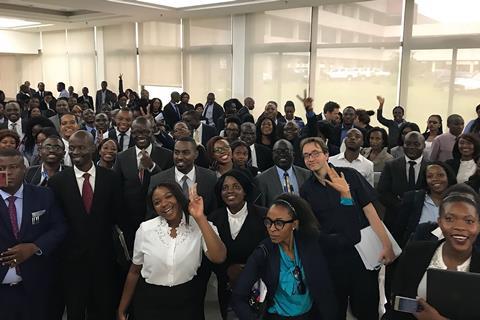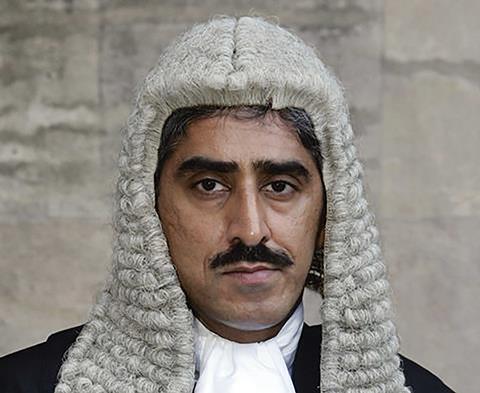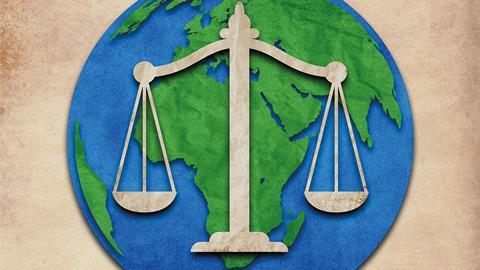Lawyers across the world who are working outwith their home jurisdictions to support the rule of law are a bulwark against authoritarianism. Joanna Goodman reports
The low down
The rule of law is in trouble globally. That is reflected in an erosion in people’s access to justice, in attacks on lawyers and the judiciary, and in efforts to limit determinative power of independent courts. The rise of authoritarianism is widely discussed. It can feel like all is lost for the rights of a growing number of people. Yet that erosion of rights is incremental, uneven. Standing in its way is the strength of civil society and institutions, with lawyers and judges able to act in service of both. They need, and in many cases receive, practical assistance and solidarity from their peers abroad. The London-headquartered International Bar Association, our judiciary, NGOs and lawyers giving their time pro bono – all play a part. That may seem unequal to the task, but the alternative to these efforts is even worse outcomes.
In 2020, marking the 25th anniversary of the International Bar Association’s Human Rights Institute (IBAHRI), its director, Labour peer Helena Kennedy KC, referred to the decline in freedom, democracy and the rule of law since the millennium. Authoritarianism was resurgent. ‘The need now is for us to reassert the centrality of law and a respect for human rights,’ she said. ‘We as lawyers are the guardians of law. We can make rights a reality.’
The challenges such efforts face is clear. According to the World Justice Project (WJP) Rule of Law Index 2023, which evaluates 142 countries and jurisdictions around the world, more than six billion people live in a country where the rule of law weakened between 2022 and 2023. The index found that for the sixth consecutive year, the rule of law has declined in most countries. The biggest declines within those 142 countries over the past seven years have been in fundamental rights (77%), constraints on government powers (74%) and criminal justice (74%).
The WJP index attributes the continued deterioration of the rule of law in 2023 to two main factors: the continuation of authoritarian trends around the world, and the failure of justice systems to meet people’s needs. Delays in civil and criminal justice systems are increasing in most countries.
Balancing act
IBAHRI, which is independent from the International Bar Association (IBA), works with the global legal community to promote and protect both human rights under a just rule of law, and the independence of the legal profession.
Sara Carnegie, director of legal projects at the IBA, explains that IBAHRI provides capacity-building and training programmes, and issues statements when the independence of the judiciary is threatened. ‘However these have to be carefully considered as there is a diplomatic angle,’ she says. ‘HRI was set up as an independent arm of the IBA, so that it could make statements without alienating bar associations and lawyers in those countries that are being criticised, while the IBA takes a more neutral position.’
There are exceptions, she explains: ‘Occasionally, the IBA issues a statement which links to egregious acts of war, for example when Russia invaded Ukraine, and after the Hamas attacks on Israel, but that created enormous furore, so the next statement on the Israel/Gaza position was issued by the HRI.’ Carnegie adds that the IBA itself has to be sensitive to the diversity of its membership.
At its annual conference last week, the IBA rule of law forum set out ways in which it tries to safeguard the independence of the judiciary and support lawyers. In addition to capacity-building projects, it issues statements and finds ways to increase pressure on authorities. ‘It is not just about state misbehaviour,’ says Carnegie. ‘The rule of law is also threatened by individuals pertaining to represent it. For example, we heard people talking about judicial corruption in Africa.’
Recent practical initiatives have included extricating female judges from Afghanistan when the Taliban took over, as well as other representatives from the Afghan Independent Bar Association (which the IBA helped to create in 2017). The association has now relaunched in Brussels as the Afghan Independent Bar Association in Exile. The IBA continues to provide ongoing support to the Ukraine Bar Association.
Judicial solidarity
The judiciary in England and Wales has a programme of international relations to support the rule of law worldwide, overseen by Lord Justice Dingemans. This voluntary work involves judges working with foreign governments and judiciaries to improve the access and delivery of justice, and providing training and support to judges.
The Standing International Forum of Commercial Courts brings together representatives from 45 jurisdictions to discuss mutual challenges including the enforcement of commercial law judgments in multiple jurisdictions. It also supports capacity-building work.
A driving principle of this work is that high-profile judges and barristers working abroad, especially in major cases, do a lot to raise awareness and respect for English law in foreign jurisdictions.
Khawar Qureshi KC is an international lawyer, arbitrator and deputy High Court judge. As a former chairman of TheCityUK Legal Services and Dispute Resolution Group and vice chairman of the international committee of the Bar Council, he has done much outreach and educational work, in addition to taking on high-profile work for governments and institutions.
Qureshi was recently instructed to appear in the Kenyan High Court on behalf of the Kenyan government – the first foreign counsel to represent the state’s interests since Kenya’s independence in 1963. ‘This demonstrates the trust that other common law jurisdictions have in our system,’ he explains. ‘It also enabled me, acting at a reduced fee, to help the Kenyan authorities with capacity-building, through daily briefings with the small legal team supporting me.’
Lawyers at risk
The Law Society’s international team works with national bars and civil society organisations in multiple jurisdictions to support lawyers at risk, through activities such as intervention letters, advocacy at the UN and regional human rights bodies, enhancing standards to protect lawyers and participating in events like International Fair Trial Day.
‘The Law Society is committed to supporting lawyers and defending human rights around the world,’ president Nick Emmerson says. ‘Our Lawyers at Risk programme supports lawyers who are targeted when carrying out their professional duties through threats, intimidation, arbitrary arrest, detention and prosecution, disappearance and even murder. In this way, the programme highlights the importance of an independent legal profession.’
Emmerson cites recent and ongoing initiatives: ‘This year, the Law Society has raised concerns about the collapse of the justice system in Afghanistan leaving lawyers, prosecutors and judges at the mercy of the Taliban. We called on the Iranian government to stop all executions, uphold the right to a fair trial and halt the arrest, detention, prosecution and ill-treatment of lawyers in Iran. We stand in solidarity with legal professionals around the world, who put their lives at risk so that people’s rights are protected and those who violate them are held accountable. We will continue to work to support them and to contribute to building strong, fair justice systems across the globe.’
And it is not just about statements. International policy manager Debra Long has been on a fact-finding mission to Turkey, visiting lawyers who are imprisoned there, as part of an international delegation of 21 law societies and bar associations.
Long says: ‘As well as offering moral support to those we are interviewing, we are using [the delegation] to raise awareness of their plight and hope through that to apply pressure for them to be released, as well as to deter the authorities from intimidating and harassing other lawyers.’ Such interventions, she says, ‘can make a real difference to lawyers at risk. It can offer moral support, knowing they are not alone and that there is a legal community speaking up. It can also lead to lawyers being released from detention or at least [improving] the conditions of detention.
‘The rule of law is at the heart of what it means to be a lawyer,’ she says. ‘Lawyers play a fundamental role in upholding rule of law and separation of powers to ensure that laws are applied equally and fairly to everyone, and that no one is above the law. If lawyers are persecuted when carrying out their professional duties this can have a chilling effect. It leaves individuals at risk of unfair trials. Public trust in the judicial system, as well as the legal profession generally, will be weakened. It can also lead to self-censorship and a reluctance by lawyers to act, diminishing the availability of independent, effective legal representation for individuals.’
She continues: ‘Unfortunately, lawyers all over the world face threats and intimidation because of their profession.’
Safeguarding justice, pro bono
Large law firms’ pro bono programmes play a major role in supporting the rule of law and access to justice in developing countries. In 2005 DLA Piper established New Perimeter, a non-profit pro bono affiliate which supports access to justice, social and economic development, and sound legal institutions.
Partner Claire Donse, international head of pro bono and co-director of New Perimeter, highlights some of the firm’s ongoing initiatives: ‘As a global law firm, we are well placed to share our practical expertise, the idea of collaborating for good with local organisations is woven throughout our pro bono efforts; be it the sharing of expertise and resource to raise capacity and develop skills [or] international cooperation with the likes of judges, prosecutors, law enforcement and anti-corruption units.

‘Since 2013, our New Perimeter affiliate has been actively working in Zambia to provide workshops on legal drafting for undergraduate students at one law school. The success of this programme was unparalleled and in 2016 we expanded this work to provide training to all law graduates preparing to take their Zambian bar exams.’
Other projects include teaching law students in Mexico about pro bono and public interest law and supporting pro bono clinics for small businesses affected by war in Ukraine.
Separately, DLA Piper’s Global Scholarships Program helps outstanding law students in developing countries reach their potential and contribute to the rule of law in their communities. ‘Access to an effective legal system is key both for economic growth and for lifting people and countries out of poverty. By supporting the next generation of lawyers in these countries, we are investing in the rule of law and promoting access to justice around the world.’
Leading by example
Access to justice is not just a problem in other jurisdictions, says Qureshi. Our global standing is affected by challenges here in the UK. ‘If we are to be the exemplar of access to justice and rule of law, we should strive to make sure that our jurisdiction is unrivalled,’ he argues. ‘Access to justice is being threatened by the inability of arbitrators and courts to control costs, and the imposition of sanctions leading to banks imposing blanket banks on certain nationalities and jurisdictions, which means those people cannot pay their lawyers. So lawyers cannot get paid, and they are concerned about reputational risk and removal of insurance.’ He highlights the question of whether all legal professionals should be bound by the equivalent of the barristers’ ‘cab rank’ rule to support access to justice, ‘especially as law firms are merging, so there are fewer available for clients to instruct’.
'If we are to be the exemplar of access to justice and rule of law, we should strive to make sure that our jurisdiction is unrivalled'
Khawar Qureshi KC
Qureshi advocates a combination of leading by example, and engaging with legal professionals in other jurisdictions to develop the law, promote access to justice and provide capacity-building. To that end he has multiple teaching engagements in Africa, the Middle East, east Asia and Europe, ‘helping foreign lawyers understand our system better and learning from them’.
Israel’s judicial reforms
Before the Israel-Hamas conflict broke out on 7 October, Israel had seen nine months of protests against prime minister Benjamin Netanyahu’s judicial reforms which sought to limit the influence of Israel’s Supreme Court. The court is currently deciding on an amendment to Israel’s Basic Law stating that judges can no longer use the legal standard of reasonableness to overrule government decisions (a standard used by many judicial systems including that of England and Wales). Further measures would allow parliament to overrule Supreme Court decisions and give the government greater control over the selection of judges. All of this has now been put on hold.
Trevor Asserson is senior partner of Israel’s largest foreign law firm, Asserson Law Offices, an English law firm headquartered in Tel Aviv. He has written a series of articles arguing that, by restricting judicial independence, the Israeli government’s judicial reform programme is challenging the rule of law, and the country’s democracy. ‘The core values which constitute a rule-of-law society must be protected. The body best qualified to protect those core values is the judiciary,’ he said.
However, although public opinion in Israel, together with the vast majority of lawyers and Israeli and international law firms there, are publicly opposed to the reforms, there has been little comment from the international legal community.
Asserson tells the Gazette: ‘Countries are generally concerned not to interfere with domestic matters, and many think this is a domestic matter for Israel to deal with, even though they are supportive of the rule of law.’ However, US president Joe Biden has spoken out against the proposed reforms, as has US human rights lawyer Alan Dershowitz, who referred to potential implications for Israel’s standing in international forums. ‘It will make it much more difficult for people like me, who try to defend Israel in the international court of public opinion, to defend them effectively,’ Dershowitz said in a radio interview earlier this year.

While international opposition to Israel’s judicial reforms has been muted, the main game-changer (aside from the current conflict) has been public demonstrations by non-political groups.
‘The remarkable thing about the Israeli judicial system is that there are few judicial systems where the people would come out en masse, week after week, in order to protect it,’ says Asserson. ‘The rule of law is so healthy in Israel, that although it is under huge threat, nine months of continuous demonstrations have made it arguably politically impossible for the prime minister and the government to move forward with their programme. The only change they managed to get through is about to be decided on by the Supreme Court who will almost certainly throw it out.’ Before the current conflict, he adds, ‘the government was negotiating a compromise to avoid that judgment being handed down’.
This is one of the debates the IBA has intervened in. IBA president Almudena Arpón de Mendívil Aldama said: ‘The IBA is profoundly concerned with the proposed reforms to the legal system that would jeopardise the rule of law.’ He called for ‘the Israeli authorities to abandon the proposed reforms and reaffirm Israel’s clear commitment to the rule of law’. Individual judges and lawyers are speaking out too. Qureshi believes: ‘When the judiciary is under threat, as it is in some jurisdictions, it’s the responsibility of all of us to support those judges.’

There is widespread concern about the growing trend in several jurisdictions to marginalise the judiciary and the legal profession (and the UK itself is hardly a beacon of rectitude in this respect). ‘Social media is being used to create pressure on lawyers acting for clients or in cases which are described as controversial,’ Qureshi observes. ‘Ultimately, these elements taken together can only undermine access to justice and the rule of law.’ He is concerned at allegations that judges in India have experienced pressure from the government in cases it takes an interest in. And in the US, Donald Trump has no problem ridiculing judges instead of respecting them. ‘These are jurisdictions where, like ours, the integrity of the judiciary is traditionally respected by all,’ he says.
There is general agreement that an independent judiciary that is respected as such protects the rule of law and is an important barrier against the degeneration of democracies into autocracies and kleptocracies. The hope is that the work of UK and international institutions, as well as professional bodies, law firms and dedicated practitioners, will continue to raise awareness help to turn the tide.
Joanna Goodman is a freelance journalist
































No comments yet